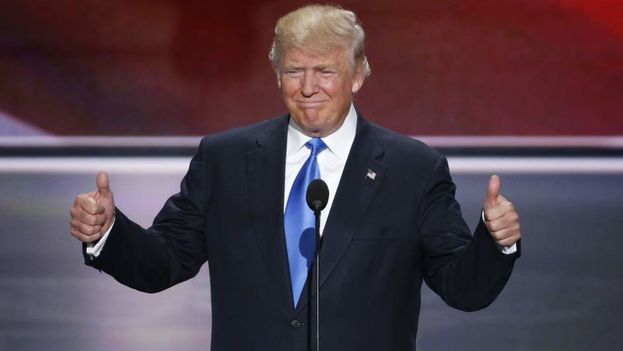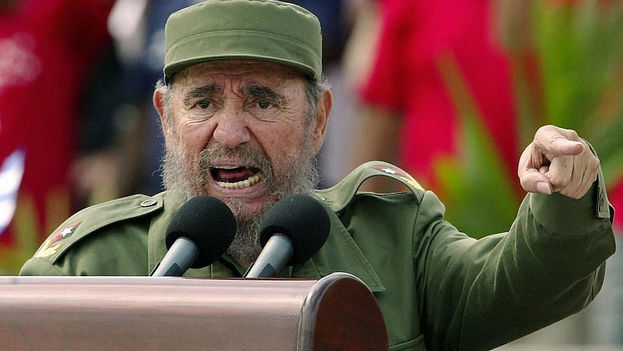
![]() 14medio, Andres Oppenheimer, 19 January 2017 — When people ask me if Donald Trump will be good or bad for Latin America, I usually respond that so far he has been bad, because his aggressive speech against Mexico and his harangues against free trade are driving away investments in the region. This week, the International Monetary Fund (IMF) partly confirmed my fears.
14medio, Andres Oppenheimer, 19 January 2017 — When people ask me if Donald Trump will be good or bad for Latin America, I usually respond that so far he has been bad, because his aggressive speech against Mexico and his harangues against free trade are driving away investments in the region. This week, the International Monetary Fund (IMF) partly confirmed my fears.
In its first economic forecast for 2017, the IMF said that the world economy will increase its growth rate to 3.4 percent this year and 3.6 percent in 2018. But the exception will be Latin America, it said. continue reading
The IMF revised downward its previous economic projections for Latin America, saying that the region will grow 1.2 percent this year and 2.1 percent in 2018. In addition to slower-than-expected growth in Brazil and Argentina, the IMF cited what it diplomatically described as “an increase of the winds of uncertainty related to US policies in Mexico”
About 80 percent of Mexican exports go to the United States, and Central America depends to a large extent on family remittances from its migrants in the United States
Curious to know more, I called Alejandro Werner, head of the IMF’s Western Hemisphere Department, and asked about the economic impact of Trump’s promises to build a wall on the Mexican border, revise the free trade agreement with Mexico, and Canada and annihilate the TransPacific Partnership Agreement among 12 countries that include Japan, Mexico, Peru and Chile.
Werner told me that it is premature to speak of a negative psychological impact throughout the region, because several countries like Brazil have not grown more for internal reasons. But he added that Trump’s proposals have already affected investments of Mexico, the second largest economy in the region, and could affect Central America.
About 80 percent of Mexican exports go to the United States, and Central America depends to a large extent on family remittances from its migrants in the United States
“The mere fact that there is uncertainty about future US trade policies leads many companies to postpone their investments in Mexico,” Werner told me. “It is holding back the investments”
Trump’s economic plans are also putting pressure on US interest rates, Werner said.
Trump’s economic plans are also putting pressure on US interest rates, Werner said. That may affect investments in Latin American countries and make it more expensive to get foreign loans.
When I asked him what would be the best scenario for Latin America under Trump, Werner said that if the US economy grows, whether through healthy economic policies or short-lived populist measures, Latin American commodity exporters will benefit. “If there is more infrastructure construction in the United States, that will help Latin American exporters of steel, copper and other products,” Werner said.
Other economists see another potential advantage for the region: they say that if Trump decided to focus its protectionist policies on China rather than Mexico, and place higher import tariffs on Chinese products than on Mexican, many manufacturers might decide to move out of China to Mexico and other Latin American countries.
My opinion: Trump’s diatribes against free trade – “They’re killing us” – and his threats to dramatically increase undocumented deportations have already had a negative economic impact on Latin America.
It is time for Trump to try to strengthen, rather than weaken, Latin American economies
It is time for Trump to try to strengthen, rather than weaken, Latin American economies. He needs to move from tweetocracy to diplomacy. On the contrary, his populist demagoguery will be counterproductive: it will provoke an economic crisis in Mexico and in other countries, which will result in more illegal migration to the United States, more drug trafficking and a new outbreak of anti-American sentiment.
Postscript: The decision of about 60 US legislators to boycott Trump’s inauguration is a mistake. It is true that Trump won partly with the help of Russia and the director of the FBI, and that for five years Trump himself led a disgusting campaign to delegitimize President Obama claiming – falsely – that he was born in Kenya, but so far no branch of the US government has declared Trump illegitimate. As long as that does not happen, we have to accept that, whether we like it or not, Trump won the election.
_______________
Editor’s Note: This article has been previously published El Nuevo Herald. We reproduce it with the authorization of the author.


